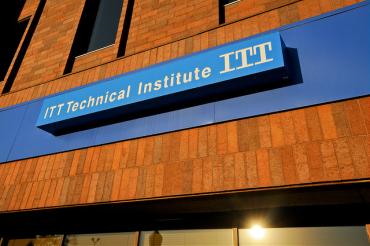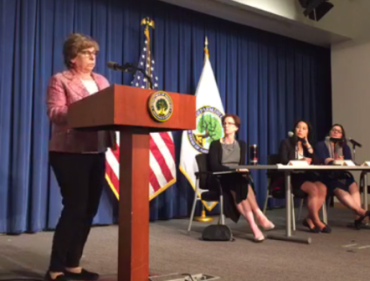Kevin Thompson did everything right. When he finished serving 20 years in the armed forces and found his skills didn't translate to the civilian world, he used the GI Bill to attend college. He liked the sound of an 18-month ITT Tech project management program that assured him he'd have jobs during class and after graduation—"both false," he says now. When ITT Tech collapsed in 2016, no college would honor his credits, and his GI Bill benefits ran out.
"I was left without a degree and loans that I cannot repay," he told Department of Education officials at a hearing July 10. "I am now two classes short of my degree and unable to complete it." Worse, this Navy veteran of 20 years and his family—a wife and three children—have been homeless. Twice.
Thompson is just one of many students duped by for-profit colleges known for making false promises about career potential, swallowing up student loan money, and leaving students with mountains of debt and no useful degrees. Until recently, defrauded students could apply for loan forgiveness. But the Education Department is threatening to roll back that policy, called "borrower defense," as well as "gainful employment" regulations that require colleges to prove their graduates are successful enough to pay back their students loans.
AFT President Randi Weingarten also testified at the July 10 hearing, urging the department to save these regulations that can make all the difference for students caught up in education fraud. "Predatory colleges across the country have financially gutted working people—many of them first-generation college students, veterans and people of color—while offering them the false hope of a good job and a fair wage," she said. "Just about the only thing worse than ripping off students with worthless degrees from for-profit colleges is denying them help to relieve their substantial debt, and allowing the schools to continue to prey on students."
The borrower defense rule, she said, standardizes debt relief for them, and the gainful employment rule prevents ineffective programs from gaining a foothold in the first place.
Read Weingarten's prepared testimony.
Tossing out these policies amounts to "waiving a white flag of surrender to predatory schools that defraud students and offer useless degrees," said Julie Murray of Public Citizen, which is suing the Education Department over the unilateral decision to put the provisions on hold.
The hearings brought testimony from both sides of the issue as the department decides whether to re-examine the policies in a "negotiated rule-making" process involving committee review and the possible delay, weakening or elimination of current rules. Participants discussed the already-completed negotiations to establish the policies, the nature of gainful employment and how it can be measured, and the impact on not-for-profit private schools, but much of the testimony was about protecting students and taxpayers from fraud.
Some school representatives complained that the regulations are onerous and threaten mom-and-pop institutions serving local populations. But Betsy Mayotte of American Student Assistance, a nonprofit advocacy group for students who need help with school loans, disagreed: "If you are not doing anything wrong, the rule will not result in your school closing."
Among those who testified in favor of borrower defense and gainful employment regulations were representatives of the National Consumer Law Center, Young Invincibles, Americans for Financial Reform, the American Legion, Student Veterans of America, Veterans Education Success, Higher Ed Not Debt and Generation Progress. U.S. Rep. Mark Takano (D-Calif.), who was a public school teacher and a community college trustee, also testified. "I saw for-profits exploit my students' hunger for opportunity," he said, and then reminded the department of its responsibilities. "The Department of Education is not responsible for protecting fraudulent, for-profit companies. It is responsible for protecting students and taxpayers."
In addition to the show of support at the hearing, a group of 19 state attorneys general recently filed a lawsuit against the Department of Education for delaying borrower defense rules with no warning or opportunity to comment; Education Secretary Betsy DeVos suspended the rule last month, days before changes took effect that would have simplified the process of lifting student debt, effectively halting any relief for students who have applied for it.
The department will hold a second hearing in Dallas on July 12 and then will decide whether to move forward with negotiated rule-making or allow the rules to stand.
[Virginia Myers]


